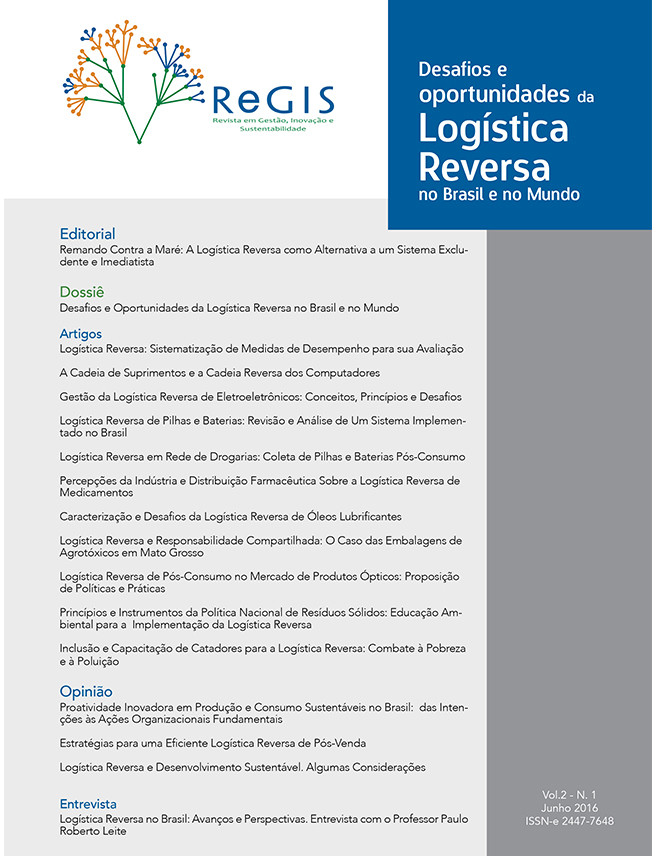Battery Reverse Logistics: Review and Analysis of a Brazilian Experience
Keywords:
Reverse Logistics. Abinee Programme. Batteries. PNRS.Abstract
This paper aims to describe how was the implementation of a reverse logistics system of batteries in Brazil, highlighting the point of view of the main actors involved and commenting on the steps that were followed in the process. It was chosen as the object of analysis Abinee Program Receives batteries, to represent the largest reverse logistics system of batteries in Brazil and include the participation of manufacturers and importers of batteries and batteries as funders and managers of this initiative. The experience will serve to guide the other sectors that will implement their reverse logistics systems, as set out in the Brazilian National Policy on Solid Waste (NPSW).
Downloads
References
BIANCOLINO, C. A.; KNIESS, C. T.; MACCARI, E. A.; RABECHINI JR., R. (2012). Protocolo para Elaboração de Relatos de Produção Técnica. Revista Gestão e Projetos, 3(2), 294-307.
BRASIL. (2010a). Lei nº 12.305, de 2 de agosto de 2010. Institui a Política Nacional de Resíduos Sólidos. Diário Oficial da União, Brasília, 3 ago. 2010.
BRASIL. (2010b). Decreto nº 7.404, de 23 de dezembro de 2010. Diário Oficial da União, Brasília, 23dez. 2010.
BRASIL. (1999). Resolução CONAMA nº 257, de 30 de junho de 1999. Diário Oficial da União, Brasília, 22 jul. 1999.
BRASIL. (2008). Resolução CONAMA nº 401, de 04 de novembro de 2008. Diário Oficial da União, Brasília, 5 nov. 2008.
CO-AUTOR et al., 2014
GOVINDAN, K.; MURUGESAN, P. (2011). Selection of third-party reverse logistics provider using fuzzy extent analysis. Benchmarking: An International Journal, 18(1), 149”“167.
MARIA, N.; LONGO, V.; MARIA, W.; GUNTHER, R. (2000). Gerenciamento de Residuos Constituidos por pilhas e baterias usadas. XXVII Congresso Interamericano de Engenharia Sanitária e Ambiental. Porto Alegre, Rio Grande do Sul, 2000.
MILANEZ, B.; BÜHRS, T. (2009). Capacidade Ambiental e Emulação de Políticas Públicas: O Caso da Responsabilidade Pós-Consumo Para Resíduos de Pilhas e Baterias no Brasil.
PARLAMENTO EUROPEU (2006). Directiva 2006/66/CE. Parlamento Europeu e do Conselho, de 06 de setembro de 2006, relativa a pilhas e acumuladores e respectivos resíduos e que revoga a Directiva 91/157/CEE.
PORTER, M. E.; VAN DER LINDE, C. (1995). Green and competitive: ending the stalemate. Harvard business review, 73(5), 120-134.
SANTOS, T. S. (2009). Do artesanato intelectual ao contexto virtual: ferramentas metodológicas para a pesquisa social. Sociologias, Porto Alegre, ano 11, no 21, jan./jun. 2009, p. 120-156.
SÃO PAULO. Secretaria de Estado do Meio Ambiente. (2012). Resolução SMA nº 38, de 5 de junho de 2012. Dispõe sobre ações a serem desenvolvidas no Projeto de Apoio à Gestão Municipal de Resíduos Sólidos. Diário Oficial do Estado, São Paulo, 6 jun. 2012.
SÃO PAULO. Secretaria do Meio Ambiente. (2012). Termo de compromisso para responsabilidade pós-consumo de pilhas e baterias portáteis.
SHI, X.; LI, L. X.; YANG, L.; LI, Z.; CHOI, J. Y. (2012). Information flow in reverse logistics: An industrial information integration study. Information Technology and Management, 13(4), 217”“232.




